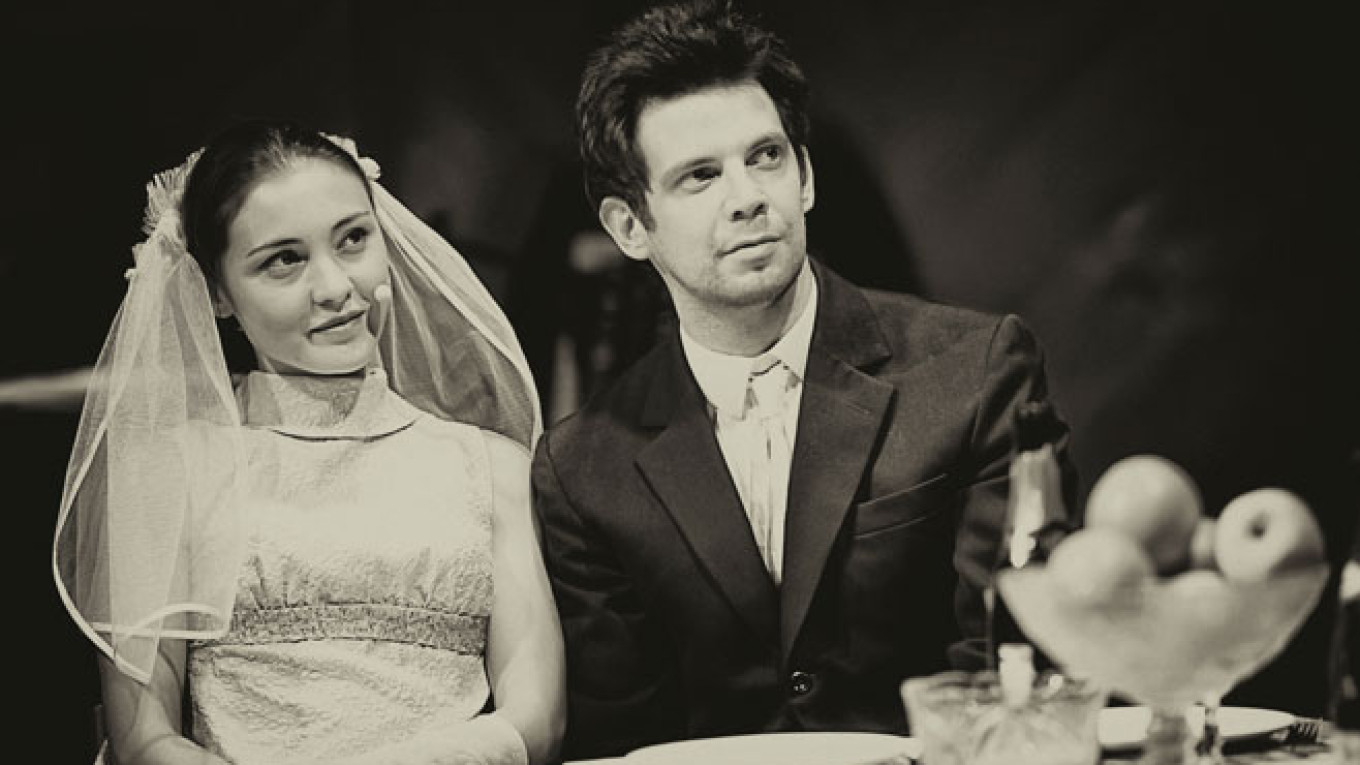The Gogol Center has done a fascinating thing over the last two seasons. It delved into some of Russia's shared cultural codes and came up with new views of old ideas.
First it dramatized three classic European films in the light of modern-day Moscow. Now it is taking on vintage Soviet films. "Nine," directed by Sergei Vinogradov and rescripted by Valery Pecheikin, provides a fresh look at Mikhail Romm's great "Nine Days of One Year."
Romm's 1962 film was a key contribution to the powerful Soviet myth of the so-called "lyrical physicists" — literally, "physicists and lyricists." The phrase referred to a subgroup of the intelligentsia, men and women who could read between the lines of both Mendeleyev's periodic table and Pushkin's verses. They embraced a holistic approach to knowledge — the sciences for them were unthinkable outside of a humanist, cultural context.
If you're struggling to get the picture, consider Andrei Sakharov, the great nuclear physicist who helped develop Soviet nuclear weaponry and evolved into an outspoken human rights advocate.
"Nine" follows the original closely. It is still the same love triangle of a brilliant researcher who literally sacrifices himself to his work, eventually dying of radiation exposure. Designer Vera Martynova left the story in the 1960s, both with the old-fashioned paneled walls and the vintage clothing designs. But the accents and many of the details are shifted enough so that the story plays out as one we might encounter today.
In Pecheikin's version, the selfless Dmitry Gusev (Semyon Shteinberg) is researching the nature of dividing living cells. He shares this passion with his colleague Ilya Kulikov (Ilya Romashko), although that is not all they share. Both love Lyolya (Svetlana Mamresheva), and she, at various times, leans toward one or the other, marrying Dmitry before ending up with Ilya.
Vinogradov pits three vastly different personalities against each other. Gusev is a man of deep convictions that he rarely if ever shows in public. He is a jokester who applies low-key irony to everything, including his marriage and his death. Ilya is a seemingly straightforward type, serious about everything, honest in all he does.
The sensitive Lyolya is caught between them in more than one way. Aside from sharing a complicated love life with them, she is ignored professionally. Imagining herself a scientist of equal stature, she is reduced to making scrambled eggs for a husband who doesn't like eggs, and she is not taken seriously as a partner in research.
The three actors work together beautifully, each differing from the others in key personality traits, but all fitting the others like custom-made gloves.
Vinogradov injects humor and a contemporary manner of fragmented narrative by sending each main character to deliver intimate confessions at a microphone, while the rest of the characters go on about their business on stage. A live musical trio provides show-stopping performances that accompany the action, as during Dmitry and Lyolya's wedding, or stand outside it, as when Margarita Kron belts out a rousing number that bagged an ovation the night I attended.
Secondary roles are anything but that in this production. Yulia Gomanyuk plays character parts ranging from the farcical to the odious — as when she plays the head of a commission that blocks Dmitry's and Ilya's research. Sergei Galakhov plays a darkly unscrupulous administrator as deftly as he interprets a drunken guest at the wedding.
Vladimir Pryanchin turns in a heartfelt monologue as a scientist who hopes one day, through the miracle of cryonics, to meet again the only woman he ever loved.
For me, the crux of the production occurs as Galakhov's administrator assures us that Russians are not behind the world in everything, as some may suggest. They are merely more cautious and take more time to think. It's a double-edged sword. On the lips of this snake, you want to laugh at the notion. But in the context of the show that unfolds, there is a deep truth to it, too.
Isn't that what keeps any myth alive? It works from every possible angle.
Note: The Gogol Center closes for renovations at month's end. The next performances of "Nine" are the last until the theater reopens in the spring.
"Nine" (Devyat) plays Oct. 17, 18 and 19 at 8:30 p.m. on the small stage of the Gogol Center, at 8 Ulitsa Kazakova. Metro Kurskaya. 499-262-9214, gogolcenter.com. Running time: 1 hour, 50 minutes.


